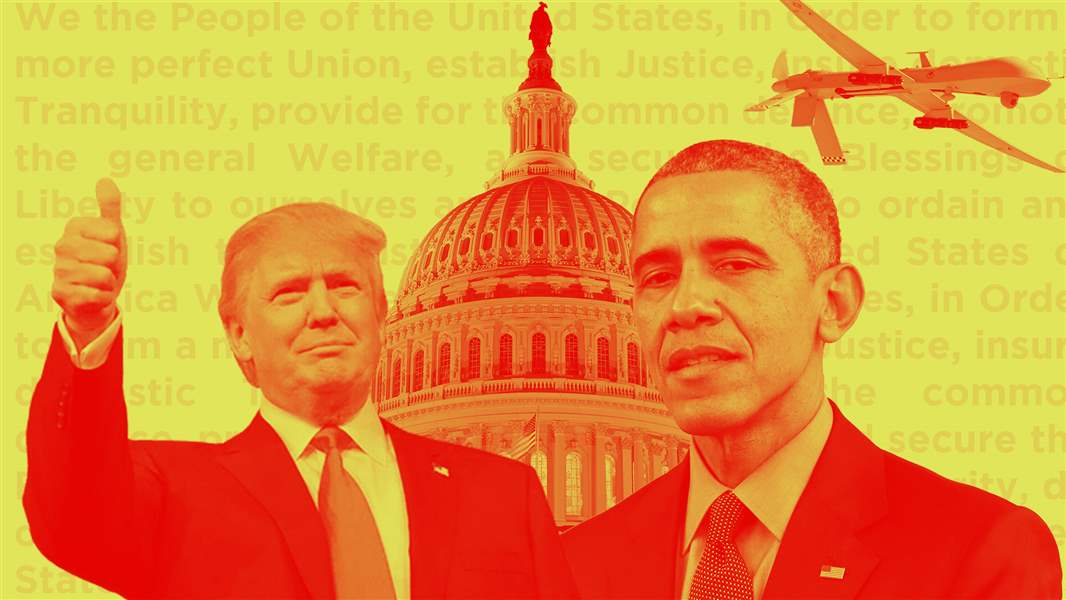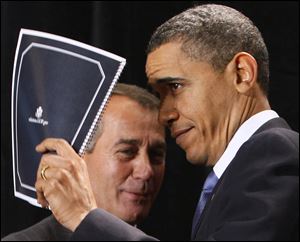
President Trump embraces the imperial presidency
2/2/2018
Photos by ASSOCIATED PRESS/Photo Illustration by WILL TOMER
Recent revelations that President Trump has expanded the United States’ controversial drone program have reignited debate about the powers of the presidency, and the balance of power within the U.S. federal government.
A recent report from the legal nonprofit organization Reprieve revealed that, in the Trump administration’s first year, the drone program caused a greater estimated loss of life than all eight years of the Obama presidency.
It was reported in the fall that Mr. Trump hoped to “loosen” Obama-era regulations on drone strikes. Thus far, he has increased the number of drone strikes in countries with which the U.S. is not at war, such as Afghanistan, Pakistan, Somalia, and Yemen.
To many observers, expanding the use of military technologies that keep soldiers off the battlefield is a good thing. However, the drone program has proven to be ineffective — during a 2013 drone campaign in Afghanistan, the missiles missed their intended target as often as 90 percent of the time. It has proven most effective in harming the standing of the U.S. in countries where drones are used.
But Mr. Trump is merely the latest U.S. president to take advantage of the expanding powers of the office. His predecessor, President Barack Obama, in particular, has been roundly criticized for seeking to increase the powers of the Executive branch of government, including his efforts to expand the use of drone strikes.
Through his presidency, Mr. Obama used drone strikes so much that he was occasionally called the “Drone King.” The numbers vary depending on the source, but the Council on Foreign Relations estimated that Mr. Obama authorized 542 drone strikes, which killed nearly 4,000 people. President George W. Bush, by comparison, only authorized approximately 50 strikes.
The Obama administration created an extrajudicial kill list, known as the “deposition matrix,” which gave Mr. Obama and his advisers the power to shoot missiles wherever and at whomever they please.
Mr. Obama, a former constitutional law professor, had campaigned on a platform in which peace and transparency in government figured prominently. As a consequence, the continued use and growing number of drone strikes was viewed with dismay by many. But Mr. Obama’s supporters continued to stand by him — placing their faith in his liberal credentials and Nobel Peace Prize — effectively extending the President’s license to kill, a license which was eventually used to kill not only foreign nationals, but also American citizens in foreign countries.
Since the end of World War II, Congress has regularly allowed presidents to claim more and more power, often abdicating its Constitutional responsibilities, and undermining the checks and balances that are a fundamental element of the American system of government.
One of the most basic questions of government is that of determining who has the authority to make war. According to the Constitution, Congress holds the power to declare war. In recent history, however, presidents have sent troops to battle without an official war declaration.

Former President Barack Obama and then-Speaker of the House John Boehner sparred over the War Powers Act in 2011.
The War Powers Act of 1973 attempted to define when and how the president could send troops to battle. According to the law, the president may initiate hostile action, but he or she has 60 days to seek formal approval from Congress after engaging in hostilities, with the possibility of a 30-day extension. It was designed to prevent the U.S. from entering into protracted military engagements without the approval of Congress.
But the War Powers Act has never been successfully employed to end any military mission. The explanation? Politics.
Some may recall that, in 2011, President Obama and then-Speaker of the House John Boehner got into a brief public dispute over the U.S. intervention in Libya. Mr. Boehner claimed the conflict constituted a violation the War Powers Act. Mr. Obama countered that he had the right to continue U.S. involvement because “U.S. operations do not involve sustained fighting or active exchanges of fire with hostile forces, nor do they involve U.S. ground troops.”
At the time, Yale Law Professor Bruce Ackerman penned a piece that argued Mr. Obama’s decision “lacks a solid legal foundation. And by adopting it, the White House has shattered the traditional legal process the executive branch has developed to sustain the rule of law over the past 75 years.”
Read last week’s column from Will Tomer
What ultimately came of this legal dispute? Nothing. The conflict carried on for several more months. Congress never moved to censure Mr. Obama for his violation of the War Powers Act.
So, the expansive use of drones by the Trump administration is a recent manifestation of a longstanding problem of our government.
Should we be alarmed?
I think so.
Our system of government was built on the idea that no one branch of government should become too powerful, and it was designed so each branch of government was restrained by the other two in several ways. A number of current federal policies, including the use of drones in military operations conducted in other countries, operate outside this framework. It is fair to say that those policies threaten the balance the framers of the Constitution believed was of critical importance.
People will be right to criticize Mr. Trump’s use of instruments of war without adequate accountability, oversight, and transparency. But those who do criticize him should be careful to understand how and why the President has acquired these powers, and they should be aware of the roles played by their congressional representatives in aiding and abetting a dangerous expansion of executive power within our system of government.
Contact Will Tomer at wtomer@theblade.com, 419-724-6404, or on Twitter @WillTomer.